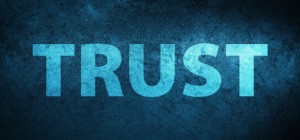 Great leaders are trusted, really trusted. This sounds almost cliché but in today’s world, trust can be elusive. Trust is like a two-sided coin. On one side is character trust. This trust is about your perceived ethics, morals, and values. You don’t lie, spin, undermine, steal, cheat — the real bad stuff. On the other side of the coin is competency trust. You are considered capable at your craft; you know your stuff.
Great leaders are trusted, really trusted. This sounds almost cliché but in today’s world, trust can be elusive. Trust is like a two-sided coin. On one side is character trust. This trust is about your perceived ethics, morals, and values. You don’t lie, spin, undermine, steal, cheat — the real bad stuff. On the other side of the coin is competency trust. You are considered capable at your craft; you know your stuff.
You can have character trust and still lack competency trust. In other words, people may consider you a good person but lack faith in your abilities. That is bad. Of course, if you are considered insincere, untruthful, or manipulative that is worse. Leaders lacking character trust can’t build a sustainable followership.
Consider a theoretical Leadership Trust Score ranging from one to ten. A leader should be concerned about any score lower than ten. Think about it, anything less than ten means that people trust you “mostly” or “kind of” or “let me think about it”.
To grow and sustain deep trust you need to focus on three dimensions: authenticity, empathy, and logic. All three all must be “tens” to achieve Leadership Trust.
Authenticity: Never be anyone but your true self. That is always good enough. Anything less creates a feeling of distance — an artificial intimacy — that most people can smoke out eventually (if not immediately). Most of us like to think we are authentic all of the time. However, if we are honest with ourselves, we will likely remember times when we weren’t. It’s human. We were hiding something — a feeling, insecurity, a resentment, something.
Empathy: I’ve spoken about empathy recently, especially in light of the current pandemic. However, regardless of the environment, empathy always matters. People want to know you care about them. They want to feel valued. If you ignore this human need by embracing an “all business” posture, people will feel used and marginalized. They will perceive it’s “all about you”. They will feel like a means to your end.
You can show a lack of empathy consciously or unconsciously. It can be intentional or unintentional. In either case, it has a devastating impact. Remember to ask people how they are doing. Ask how their spouse and kids are doing. Apologize when you are wrong. Follow the Golden Rule.
Here is what Col. Eric G. Kail, who served at the U.S. Military Academy at West Point, said about empathy:
People decide just how much they will allow you to lead them. Sure, if you are in charge, people will most likely do as you say. But how well they carry out your commands and for how long is their decision, not yours.
Logic
You didn’t get where you are without demonstrating smarts both intellectually and emotionally. From a leadership perspective, “Smarts” is manifested in how you conduct yourself and the decisions you make. Do you demonstrate sound judgement, free of biases and prejudices? Are you rational and composed, especially under pressure? Do you know what you know… and what you don’t know?
Communication plays a big role here. You may have a solid argument, grounded in facts, but appear illogical or confused due to poor communications. Make sure you communicate effectively, which implies simply, clearly, and concisely. Also, never forget that a large part of communication is asking questions and listening. I don’t know any C-level executive who can’t improve communications. It is a constant work-in-progress.
Putting it all together: You need to monitor and grow your authenticity, empathy, and logic continually. Never take your followers’ trust for granted. Like a stool with three legs, if one of these three dimensions is “loose”, the chair wobbles. Accept that circumstances like today’s pandemic put significant pressure on your “Trust Score”. Necessary but painful decisions create anxiety, angst, and resentment. The only antidote is to embrace Trust as your MOST IMPORTANT ASSET. Without it, almost nothing is possible. With it, almost anything can be achieved.